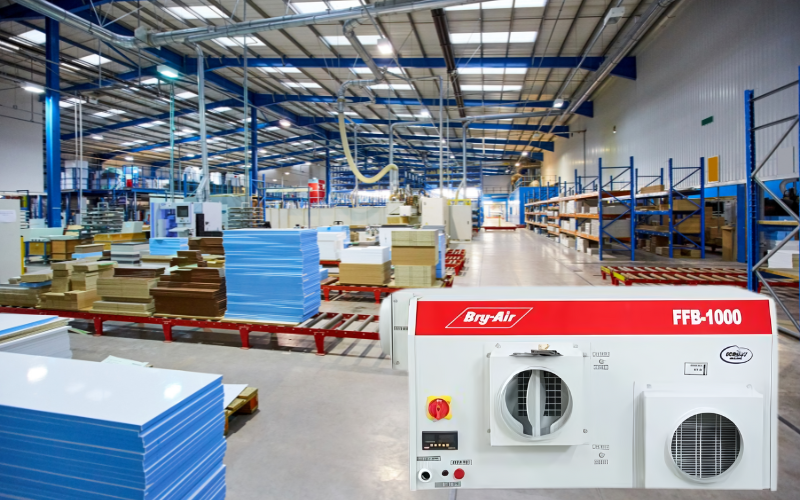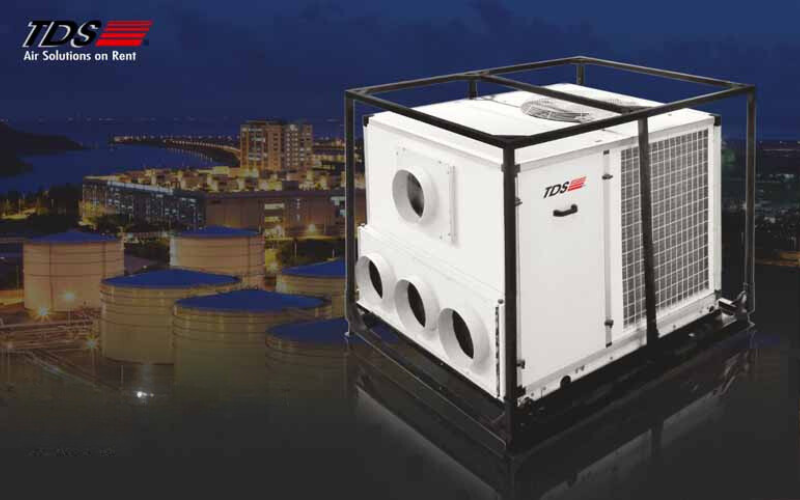High humidity levels can severely impact valuable assets, ranging from sophisticated machinery to essential documents, causing them to deteriorate or malfunction. The right balance of moisture in the environment is vital to prevent such adverse effects, and this is why dehumidification becomes essential. These techniques not only protect assets but also enhance their longevity and functionality.
This blog aims to provide information about the significance of dehumidification, emphasizing its crucial role in asset preservation. It also sheds light on the benefits of maintaining optimal humidity levels and offers insights into different dehumidification strategies designed to shield and prolong the life of your valuable assets, ensuring they remain in optimal condition despite challenging environmental conditions.
Importance of Cooling and Dehumidification
Cooling and Dehumidification is crucial in establishing and maintaining optimal environmental conditions, particularly in areas prone to high humidity levels. This process goes beyond providing comfort, it is essential for safeguarding various assets, enhancing their durability, and ensuring their peak performance. In environments where humidity levels are not controlled, there is a heightened risk of corrosion, mould proliferation, and other forms of degradation. These issues are detrimental to the physical state of assets and can lead to significant financial losses due to repair, replacement, or reduced efficiency. By effectively managing humidity, dehumidification helps in averting these potential problems, ensuring a stable and reliable environment for the assets and the people interacting with them. It is a proactive measure that pays dividends in the long run, protecting investments and maintaining the integrity and functionality of crucial equipment and infrastructure.
Assets that ca be at risk due to excess humidity
Excess humidity can significantly impact a wide range of assets, from industrial equipment to building structures and stored goods.
Metals may corrode, leading to weakened structural integrity and the premature failure of machinery parts.
Electronic components are particularly vulnerable as humidity can cause short-circuits and component failures.
Additionally, excess moisture encourages the growth of mold and mildew, which can degrade materials like wood and textiles and negatively affect indoor air quality.
One industry heavily impacted by high humidity levels is the pharmaceutical industry. Here, controlled environmental conditions are crucial for maintaining the efficacy and shelf life of medications. Excessive moisture can lead to the degradation of active pharmaceutical ingredients and affect the stability of formulations, potentially rendering products ineffective or unsafe.
Short-term dehumidification can offer an effective solution to these challenges. By temporarily reducing moisture levels in the air, dehumidifiers can help maintain the integrity of sensitive products and equipment during critical periods of production or storage. This not only ensures compliance with regulatory standards but also helps in preventing product losses and costly equipment malfunctions, ultimately maintaining operational efficiency and product quality in humidity-sensitive industries.
Benefits of Proper Dehumidification
1. Preservation of Samples and Equipment: In laboratories and industrial settings, the integrity of samples and equipment functionality can be compromised by excess moisture. Dehumidification ensures a stable environment that is conducive to accuracy and reliability.
2. Energy Efficiency: Humid air requires more energy to cool because the air conditioning system needs additional energy to remove the moisture in the air, not just to lower the temperature. When the air is humid, air-conditioning systems must work harder not only to lower the temperature but also to remove moisture. By removing excess moisture from the air before cooling, the air conditioning systems operate more efficiently. This efficiency leads to lower energy usage, which not only results in cost savings but also lessens the environmental impact by reducing the demand for power resources and decreasing greenhouse gas emissions.
3. Asset Protection: From paper documents to electronic devices, all are vulnerable to the effects of moisture. Dehumidification acts as a shield, prolonging the life and utility of these assets.
Why Dehumidification Matters
Dehumidification is essential as it establishes a controlled environment, protecting assets from the negative impacts of excessive moisture. This protection is vital for maintaining the condition and longevity of physical assets and ensuring uninterrupted operational flow. In various industries, high humidity levels can be a significant disruptor, hindering processes and potentially causing costly downtime. By effectively managing humidity, dehumidification helps maintain a consistent and reliable operational environment, enhancing productivity and preventing the degradation of equipment and materials. It is a proactive measure that supports the overall health of an operational ecosystem, ensuring that processes run smoothly and efficiently without the interference of moisture-related issues. Thus, the role of dehumidification extends beyond mere asset protection, it is an integral to the operational integrity and efficiency of businesses, particularly in moisture-sensitive industries.
The Dehumidifier Solution: Immediate Relief and Long-Term Benefits
Dehumidifiers present a practical and direct approach to addressing humidity challenges, delivering prompt relief by removing surplus moisture from the environment. Their value extends beyond instant results, they foster a healthier atmosphere, curbing the growth of mould and mildew, which are common in damp conditions. Moreover, dehumidifiers play a critical role in preserving the structural integrity of buildings and materials, countering the adverse effects of moisture over time. By mitigating moisture-induced deterioration, they ensure the longevity and durability of various assets, contributing to a more stable and reliable environment. This long-term benefit of dehumidifiers makes them indispensable in maintaining the quality and safety of spaces affected by high humidity levels.
Removing Air Moisture for Protecting Assets in High Humidity
The fundamental goal of dehumidification is to remove surplus moisture from the atmosphere, thereby establishing a setting that discourages mould growth and the progression of rust, which can severely compromise the integrity of various materials. This process is vital in preventing deterioration of metal components, decay of organic materials, and malfunction of electronic devices. By stabilizing humidity levels within an optimal range, dehumidification acts as a protective barrier for assets, enhancing their longevity and preserving their functionality. It is an essential measure in environments where humidity can escalate, ensuring that investments in machinery, infrastructure, and valuable items are shielded from moisture-related damage. Through effective dehumidification, businesses and individuals can secure their assets, maintaining their condition and performance over extended periods, thus safeguarding their investments from the adverse effects of high humidity.
TDS Rental Service for Dehumidifiers
TDS offers a comprehensive rental service for dehumidifiers, providing flexible solutions tailored to your temporary or long-term needs. Whether you are facing an unexpected humidity issue, require additional support for a specific project, or need a dehumidifier for a limited period, TDS has you covered. Our rental service includes a wide range of dehumidifiers from compact units for small spaces to industrial-grade systems for larger areas. With our rental service, you benefit from the latest technology without the commitment of a purchase, ensuring your environment remains optimal. The rental options of TDS offer convenience, cost-effectiveness, and the assurance of expert support throughout your rental period.
Conclusion
From protecting delicate samples and sophisticated machinery to preserving the structural integrity of buildings, maintaining optimal moisture levels is essential for asset longevity and functionality. This blog covered crucial aspects ranging from various strategies to benefits of effective humidity control, highlighting how it enhances energy efficiency, prevents material degradation, and supports operational integrity.
At TDS, we specialize in providing customized cooling and dehumidification solutions tailored to meet the unique needs of your environment and challenges. Whether you are dealing with unexpected moisture problems or need ongoing support to manage humidity in moisture-sensitive settings, TDS offers flexible rental services for a wide range of dehumidifiers. Our solutions are designed to offer immediate relief and long-term benefits, ensuring that your operations remain uninterrupted and your assets are protected.
Secure your investments and enhance your operational environments with TDS’s expert dehumidification services. Discover how our innovative solutions can help you maintain the ideal conditions for your assets by visiting our website at www.TDSAsia.net. Protect your assets, optimize your operations, and ensure a healthier, more stable environment with TDS Asia’s comprehensive dehumidification offerings.





